Edie Melson's Blog, page 50
June 2, 2024
Pray Over Your Writing with These 21 Bible Verses
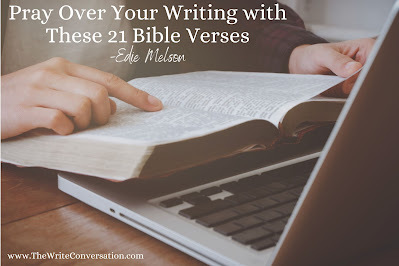
by Edie Melson @EdieMelson
Many of us are just back home after the Blue Ridge Mountains Christian Writers Conference. Others may have been unable to attend. Even more of you may be facing a time of discouragement or even a season of success. The truth is this:
No matter where we are as writers, it's always the BEST time to pray!Anyone who knows me, knows that I only have one hard and fast rule about writing:
Pray before my fingers hit the keys!
While some of the things we pray are obvious, some aren’t. Today I’m sharing other things to pray that you may not have considered.
21 Bible Verses to Pray for Your Writing
1. Thank God for the gift of writing He’s giving you. Every good gift and every perfect gift is from above, coming down from the Father of lights with whom there is no variation or shadow due to change. James 1:17
2. Ask God to give you a joyful heart in the midst of difficulty. Rejoice in hope, be patient in tribulation, be constant in prayer. Romans 12:12
3. Ask God to give you clarity of mind. I will instruct you and teach you in the way you should go; I will counsel you with my eye upon you. Psalm 32:8
4. Ask God to help you let go of expectations and fix your eyes on Him. Set your minds on things that are above, not on things that are on earth. Colossians 3:2
5. Ask God to keep you from growing weary as you work. And let us not grow weary of doing good, for in due season we will reap, if we do not give up. Galatians 6:9
6. Ask God to give you the rest you need. Come to me, all who labor and are heavy laden, and I will give you rest. Take my yoke upon you, and learn from me, for I am gentle and lowly in heart, and you will find rest for your souls. For my yoke is easy, and my burden is light.” Matthew 11:28-30
7. Ask God to protect you from your own heart the cruel words we all say to ourselves. The heart is deceitful above all things, and desperately sick; who can understand it? Jeremiah 17:9
8. Ask God to help you know what to keep and what to change. Therefore, this is what the Lord says: “If you return, then I will restore you— You will stand before Me; And if you extract the precious from the worthless, You will become My spokesman. They, for their part, may turn to you, But as for you, you are not to turn to them. Jeremiah 15:19
9. Ask God to give you the faith to fulfill His purpose in your writing. For we are his workmanship, created in Christ Jesus for good works, which God prepared beforehand, that we should walk in them. Ephesians 2:10
10. Ask God to protect you from the hurtful words of others. No weapon that is fashioned against you shall succeed, and you shall confute every tongue that rises against you in judgment. This is the heritage of the servants of the Lord and their vindication from me, declares the Lord.” Isaiah 54:17
11. Ask God to give you strength. I can do all things through him who strengthens me. Philippians 4:13
12. Ask God to give you the patience you need to wait on His timing with your words. But they who wait for the Lord shall renew their strength; they shall mount up with wings like eagles; they shall run and not be weary; they shall walk and not faint. Isaiah 40:31
13. Ask God to provide others to walk this path with you. Two are better than one, because they have a good reward for their toil. Ecclesiastes 4:9
14. Ask God to help you learn what you need to learn. If any of you lacks wisdom, let him ask God, who gives generously to all without reproach, and it will be given him. James 1:5
15. Ask God to give you friends who will speak the hard truth. Iron sharpens iron, and one man sharpens another. Proverbs 27:17
16. Ask God to put others in your path for you to encourage. Therefore encourage one another and build one another up, just as you are doing. 1 Thessalonians 5:11
17. Ask God to give you discernment as you gather writing friends. Whoever walks with the wise becomes wise, but the companion of fools will suffer harm. Proverbs 13:20
18. Ask God to keep you from anxiety about any aspect of your writing life. Do not be anxious about anything, but in everything by prayer and supplication with thanksgiving let your requests be made known to God. Philippians 4:6
19. Ask God to give you the courage you need to stay the course. Have I not commanded you? Be strong and courageous. Do not be frightened, and do not be dismayed, for the Lord your God is with you wherever you go.” Joshua 1:9
20. Ask God to protect you from jealousy and give you a generous heart for others’ success. A tranquil heart gives life to the flesh, but envy makes the bones rot. Proverbs 14:30
21. Ask God to use your words in ways beyond what you can hope or imagine. Now to him who is able to do far more abundantly than all that we ask or think, according to the power at work within us Ephesians 3:20
These are the things I pray regularly for my writing and for my friends who are writers.
I'd love to hear what you would add to the list. Please leave your suggestions—along with a Bible verse—in the comments section below!
Don't forget to join the conversation!Blessings,Edie
TWEETABLEPray Over Your Writing with These 21 Bible Verses - @EdieMelson (Click to Tweet)
 Edie Melson is a woman of faith with ink-stained fingers observing life through the lens of her camera. No matter whether she’s talking to writers, entrepreneurs, or readers, her first advice is always “Find your voice, live your story.” As an author, blogger, and speaker she’s encouraged and challenged audiences across the country and around the world. Her numerous books reflect her passion to help others develop the strength of their God-given gifts and apply them to their lives. Connect with her on her website, through Facebook, Twitter and on Instagram.
Edie Melson is a woman of faith with ink-stained fingers observing life through the lens of her camera. No matter whether she’s talking to writers, entrepreneurs, or readers, her first advice is always “Find your voice, live your story.” As an author, blogger, and speaker she’s encouraged and challenged audiences across the country and around the world. Her numerous books reflect her passion to help others develop the strength of their God-given gifts and apply them to their lives. Connect with her on her website, through Facebook, Twitter and on Instagram.
Published on June 02, 2024 22:00
June 1, 2024
Writer, Where Have You Come from and Where are You Going?
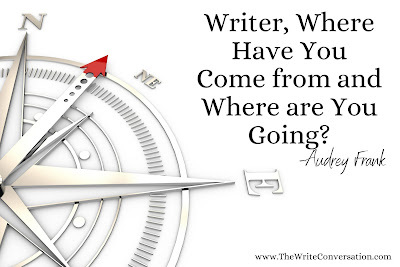
by Audrey Frank @AudreyCFrank
And He said…Hagar, where did you come from and where are you intending to go? And she said, I am running away from my mistress Sarai (Genesis 16:8).
Her eyes shone like the chocolate gravy I learned to make from my grandmother, sweet and rich. In her hand she gripped a worn piece of paper, reverently folded inside a plastic protector.
Here’s my story.
Behind her, the line of story carriers stretched long and winding. Each one held a sacred piece of paper, sunlight flickering off the plastic like a string of blinking Christmas lights disappearing around the corner of the dusty brick building.
Refugees hoping for passage to another country must carry their stories with them. At each stop along the way, the same question is asked.
Where did you come from and where are you intending to go?
I am running away from the war that killed my family.
I am running away from unemployment.
I am running away from hunger.
I am running away from persecution.
I am running to a better life.
The story they carry is the key from Here to There. Some tell fictional tales worthy of a New York Times bestseller. Others tell stories so true the reader is rendered speechless. Many have never had a voice before now and the mere telling of the story itself is healing.
In today’s Bible quote, God is talking to an Egyptian woman named Hagar. Hagar was a refugee. Her very name means “to flee.”
Refugees have a tale to tell us, writers. No matter where our Here or There, we must all answer the same question at some point.
Where have you come from and where are you intending to go?
The one who stands on the threshold of Writer, still unsure if she’s worthy of the title, must answer. The one who has written in private for too long, his words brimming over, demanding to be shared, must answer the question. The famous one, the one unknown, the experienced one, and the dreamer, all must answer the question. It is the key to moving from Here to There.
Where have you come from today, writer? Where are you intending to go?
The One who asks you is no imperfect human, tasked with the grueling responsibility of judging whether your story is worthy of passage. Oh no, the One who asks you is the Lord, the Author and Finisher of all our stories, the One who knows the end from the beginning. He will help you answer the question, for He has good plans for you. And as Hagar would declare only moments after, “You are the God who sees me!” (See Genesis 16:13.)
Won’t you take a moment with Him today to think on this?
Lord, You know where I have come from and where I want to go. Show me the way. Amen.
TWEETABLEWriter, Where Have You Come from and Where are You Going? @AudreyCFrank on @EdieMelson (Click to Tweet)
 Audrey Frank is an author, speaker, and storyteller. The stories she shares are brave and true. They give voice to those whose words are silenced by shame, the hard things in life that don’t make sense, and the losses that leave us wondering if we will survive. Audrey and her family have spent over twenty years living and working among different cultures and world views, and she has found that God’s story of redemption spans every geography and culture. He is the God of Instead, giving honor instead of shame, gladness instead of mourning, hope instead of despair. Although she has three different degrees in communication and intercultural studies, Audrey’s greatest credential is that she is known and loved by the One who made her.
Audrey Frank is an author, speaker, and storyteller. The stories she shares are brave and true. They give voice to those whose words are silenced by shame, the hard things in life that don’t make sense, and the losses that leave us wondering if we will survive. Audrey and her family have spent over twenty years living and working among different cultures and world views, and she has found that God’s story of redemption spans every geography and culture. He is the God of Instead, giving honor instead of shame, gladness instead of mourning, hope instead of despair. Although she has three different degrees in communication and intercultural studies, Audrey’s greatest credential is that she is known and loved by the One who made her.Audrey is the author of Covered Glory: The Face of Honor and Shame in the Muslim World (Harvest House Publishers), an outpouring of Audrey’s heart to introduce others to the God of Instead. Shame is not unique to the developing world, the plight of the women behind veils, young girls trafficked across borders; shame is lurking in hearts everywhere. Through powerful stories from women around the world, Covered Glory illuminates the power of the Gospel to remove shame, giving honor instead. Available at favorite booksellers: BARNES & NOBLE, BOOKS A MILLION, AMAZON.
Published on June 01, 2024 22:00
May 31, 2024
Writers Need Other Writers—4 People We Need to Find at a Writing Conference
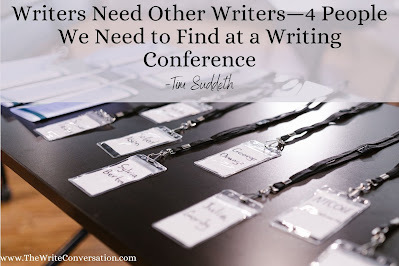
by Tim Suddeth @TimSuddeth
When I attended the Blue Ridge Mountains Christian Writers Conference with about 600 other writers, I had a blast. I felt I was with my peeps. Edie jokes that it’s when we’re with other writers that we can most feel that we are understood.
Normal people, non-writers, might worry a little when they hear us talk about the voices in our heads. When we get giddy about discovering a new word. When we talk about mixing genres.
Normal people, non-writers, don’t understand how we can spend hours at our keypads. Why receiving the latest edition of a writing magazine means we’ll spend the rest of the evening holed up in our favorite reading chair.
Writers are assumed to be solitary individuals, but that isn’t true. We just have to find the right group or tribe.
Four People Every Writer Needs
1. A Role ModelA writer needs someone to look up to who has or is doing what he or she hopes to accomplish. It’s easy to think that writing is just a dream. Nobody is going to want to read what you write. And they sure aren’t going to pay for it.
All writers live in New York with fancy degrees from important colleges. They live in expensive penthouses, driving imported cars, and have trust funds. And I don’t fit.
Sound familiar?
When I starting writing, I wondered if someone really could write for a living? Or have their writing published and read?
So I joined a local writers group. And lo and behold, we had published writers and successful bloggers there who lived just down the street from me. Real people driving clunkers and with kids in school, parents needing care.
It doesn’t have to be just a dream.
2. A PeerWhen you run into something difficult, it’s easy to think that you are the only one who has ever experienced it. That’s why we like to turn to others who are in the same boat. This is especially true for writers. Whether they’re called accountability partners or critique group members, it’s nice to know that you aren’t the only one getting those rejection letters. To know that they cried at the scene that was so important in your short story.
Peers can encourage you when you’re getting overwhelmed with advice on the social media that you MUST have. They can give you that kick in the pants when you decide that writing is just too tough and you can’t keep going.
And they will celebrate with you when the dream becomes reality.
3. A Fan/ReaderA writer spends so much time staring at the screen or piece of paper. They know what they are trying to say, but is it coming across to the reader? And does anyone else feel the same way, ask the same questions, have the same problems?
So, you find yourself sitting at a table or standing in line, and someone you’ve never seen rushes up and nervously says, “I read your story and it really spoke to me. You’re a good writer.”
You’re torn between “Aw shucks. It was nothing” and “Did you really like it? What did you think about . . .”
And you can’t wait to get back to that empty screen.
4. A New WriterEvery year I am amazed at how many new writers attend the conference. I was fortunate to sit with several at the dinner tables and I always ask about their writing. It is easy to become jaded as a writer at the struggles and hurdles you face when you try to get published. Comparing yourself to other writers you know and seeing how short you are from your goal.Then you talk to a new writer, a newbie. And you are reminded of the enthusiasm you started with. “You spoke to an agent?”“You’re writing a book?”“You were in what magazine?”
They remind us of our dreams. Of how far we’ve come, and the joy that we find in the journey.
I guess that’s the key, seeing writing as a journey. You can lock the door and write all by yourself, but why would you want to? The journey is so much more valuable, and enjoyable, when you travel it with others.
TWEETABLEWriters Need Other Writers—4 Valuable Categories from @TimSuddeth on @EdieMelson (Click to Tweet)
 Tim Suddeth is a stay-at-home dad and butler for his wonderful, adult son with autism. He has written numerous blogs posts, short stories, and three novels waiting for publication. He is a frequent attendee at writers conferences, including the Blue Ridge Mountain Christian Writers Conference and a member of Word Weavers and ACFW. He lives near Greenville, SC where he shares a house with a bossy Shorky and three too-curious Persians. You can find him on Facebook and Twitter, as well as at www.timingreenville.com and www.openingamystery.com.
Tim Suddeth is a stay-at-home dad and butler for his wonderful, adult son with autism. He has written numerous blogs posts, short stories, and three novels waiting for publication. He is a frequent attendee at writers conferences, including the Blue Ridge Mountain Christian Writers Conference and a member of Word Weavers and ACFW. He lives near Greenville, SC where he shares a house with a bossy Shorky and three too-curious Persians. You can find him on Facebook and Twitter, as well as at www.timingreenville.com and www.openingamystery.com.
Published on May 31, 2024 22:00
May 30, 2024
Why I Love a Writers Group & How to Find a Great One!

by Edie Melson @EdieMelson
I field a lot of questions about the value of having a critique group and/or partner. There are as many answers as there are writers. But there are very few who are able to produce publishable writing in a vacuum.For me personally, I wouldn’t be where I am today as a writer if it weren't for the groups who have nurtured me along the way.
Although we tend to think of writing as a primarily solitary pursuit, writing for publication is an endeavor built on forging relationships. And those relationships can ultimately determine our success or failure in the writing industry.
Here’s a list of those relationships.Between you and other writersBetween you and the readerBetween the reader and the subject or charactersBetween you and the editorBetween you and your agent
I listed the relationship between writers first, because surprisingly, those are often the most vital in our writing life. The actual act of putting words on paper is a solitary act and because of that it’s easy to lose perspective.
Writing in a vacuum can give us a false sense of whether or not we’re effective in our endeavor. We either wind up thinking we’re a genius or sink into the depths of despair because we can’t string two coherent sentences together. Rarely is either perspective accurate.
We need others in our profession to give us feedback, keep us grounded and provide encouragement. You may be tempted, like I was at first, to insert friends and family into this role. Unless they’re also writers this dynamic just doesn’t work. They’ll unwittingly encourage you when you need a swift kick in the pants and administer the kick in the pants when you need encouragement.
That’s where a writers group, critique group or critique partner will help. But you have to be careful—some critique and writers groups can be toxic. I’ve visited some where the purpose appears to be to build up the one delivering the critique by tearing down the hapless author. You want to avoid these groups at all cost.
Here’s a list of what to look for in a group or a partnerAn encouraging atmosphere—not all sweetness and light—nobody improves on false compliments. But I’ve almost never found a manuscript that didn’t have some redeeming quality.A mutually beneficial relationship. You should both bring something valuable if it’s a partnership—you may excel at writing dialogue and your partner is a whiz at description.A hunger to improve. If it’s a group there should be a movement toward growth in the majority of members. Even if you’re all beginners, if you’re all reading writing books and attending classes you’ll be able to grow and learn together.A timekeeper. If someone’s not willing to keep track of the time not everyone will get a chance to be critiqued. It’s a dirty job, but someone’s got to do it!So now here’s your chance—what experiences have you had with writing groups and partnerships? Be sure to share your thoughts in the comments section below.
Don’t forget to join the conversation!Blessings,Edie
TWEETABLEWhy I Love a Writers Group & How to Find a Great One! from @EdieMelson (Click to Tweet)
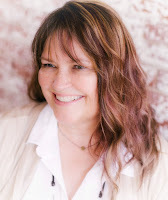 Melson is a woman of faith with ink-stained fingers observing life through the lens of her camera. No matter whether she’s talking to writers, entrepreneurs, or readers, her first advice is always “Find your voice, live your story.” As an author, blogger, and speaker she’s encouraged and challenged audiences across the country and around the world. Her numerous books reflect her passion to help others develop the strength of their God-given gifts and apply them to their lives. Connect with her on her website, through Facebook, Twitter and on Instagram.
Melson is a woman of faith with ink-stained fingers observing life through the lens of her camera. No matter whether she’s talking to writers, entrepreneurs, or readers, her first advice is always “Find your voice, live your story.” As an author, blogger, and speaker she’s encouraged and challenged audiences across the country and around the world. Her numerous books reflect her passion to help others develop the strength of their God-given gifts and apply them to their lives. Connect with her on her website, through Facebook, Twitter and on Instagram.
Published on May 30, 2024 22:00
May 29, 2024
Bullet Journaling Tips for Writers
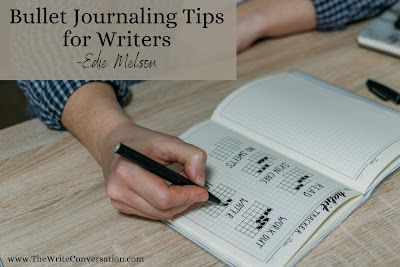
by Edie Melson @ediemelson
There’s a new organizational craze making its way around the world—Bullet Journaling. This process was created several years ago by Ryder Carroll as a way to “Track Your Past, Order Your Present, Plan Your Future.” I highly recommend watching this short video that explains the bullet journaling process.
Below is the video I made to introduce you to my bullet journal. Further down is a list of Bullet Journal basics, along with a list of resources, websites, and Instagram accounts.
I came a little late to this organizational process and discovered bullet journaling almost two years ago. Frankly, it has revolutionized my life. Up until this tracking system, I had never been able to keep up with a planner or a calendar with any consistency. I couldn’t even seem to find a way to keep dates accurately in my iPhone.
Why does it work so well for me? Because it is flexible and customizable.
Today I’m going to do more than just fan-girl over this way of keeping track. I’m going to break it down and share why I think it is so perfect for writers in particular.
BuJo (Short for Bullet Journal) BasicsAt the core, the beauty of bullet journaling is something called rapid logging. This is the ability to organize tasks and information in a concise and precise way using lists and qualifiers (symbols).Future LogMonthly LogDaily LogSymbols· Bullet is used to denote a task o An open circle is used to denote an event - A dash is used for notes
> Task migrated< Task scheduled
CollectionsThis is everything else, from lists, logs, daily tasks & goals, etc. Collections can includeBooksFilmsCharacter NamesBucket ListsLogs could includeWord countArticle ideasMemory versesGoalsMeals & meal planningTips for Developing Personalized Daily Tasks & GoalsWrite x number of wordsEdit x number of wordsWrite/edit for x amount of timeIdeas for PlanningNaNoWriMoScene MappingFreelance LogOther IdeasBlogging calendarList of publishers for a particular projectChecklist before submittingEditing checklistChecklist before publishing a blog
TWEETABLEBullet Journaling Tips for Writers from @EdieMelson (Click to Tweet)
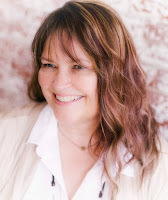 Melson is a woman of faith with ink-stained fingers observing life through the lens of her camera. No matter whether she’s talking to writers, entrepreneurs, or readers, her first advice is always “Find your voice, live your story.” As an author, blogger, and speaker she’s encouraged and challenged audiences across the country and around the world. Her numerous books reflect her passion to help others develop the strength of their God-given gifts and apply them to their lives. Connect with her on her website, through Facebook, Twitter and on Instagram.
Melson is a woman of faith with ink-stained fingers observing life through the lens of her camera. No matter whether she’s talking to writers, entrepreneurs, or readers, her first advice is always “Find your voice, live your story.” As an author, blogger, and speaker she’s encouraged and challenged audiences across the country and around the world. Her numerous books reflect her passion to help others develop the strength of their God-given gifts and apply them to their lives. Connect with her on her website, through Facebook, Twitter and on Instagram.
Published on May 29, 2024 22:00
May 28, 2024
A Different Perspective on Social Media for Your Writing Ministry
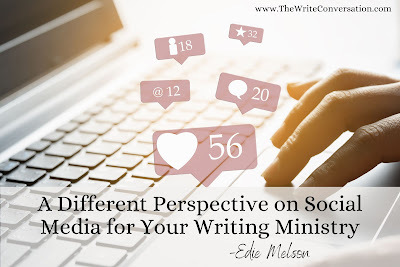
by Edie Melson @EdieMelson
It’s easy to be overwhelmed by all that’s involved in being a writer today. Beyond what we’re called to do in the physical realm, we’re now required to build a community in the digital world.
Things Writers Have Been Told They Must Do:Have a platformKeep the numbers growingBuild valuable connectionsSchedule webinarsShare memesStart podcastsBlogSpeakOh yes, and publish
The list goes on, and we get buried deeper under the weight of all our responsibilities.
Before we give in to weariness and discouragement we need to stop, and think about why we’re here. Why do we do what we do?
We do this because we heard God speak…maybe not in an audible voice…but we heard him in our souls and we answered His call.
Now with the avalanche of expectations, many are in danger of missing His voice. We want to honor His call, His willingness to issue an invitation to join Him in His work, yet we find ourselves in a miserable no-mans-land between ministry and marketing.
Maybe we’re not as far from God’s call as we think we are.
I challenge you to take a look at social media from a different perspective.
I propose that we might have been looking at things upside down.
I’ve come to believe social media IS the call… or at least a solid part of the call. What if this isn’t all about us, but about opening ourselves up, putting ourselves out there, taking chances, and building bridges BECAUSE GOD HAS A PLAN?
If we began changing our focus to align with ministry, writing, and service, instead of chasing numbers, everything else would change too. Our goals would change from focusing on the number of people we reach to the individuals we impact. And that small shift could bring back the joy and release us from stress.
One of the biggest complaints I hear about social media involves numbers—how to grow them and how to turn them into a solid community.
I propose that there is only one number we need to focus on when it comes to evaluating our online ministry. Of course, I’m referring to the number one. We know we need to concentrate on serving God and walking closely with Him.
But I think we also need to look at the number one when we consider those God sent us to serve. God knows each person He sends to us. He is concerned with them—one at a time. Can we do any less? We must quit looking at our online interactions in great lumps of numbers and instead see them as God sees them.
Being visible online as a writer isn’t easy. God’s word is clear that we are called to be a light in the dark. There’s no place darker than social media. We know that, we’ve seen the devastation through the past few years.
Yet God told us to go out into the world. Folks, that includes the World Wide Web.
He warned us that the world hated Him and it would hate us too. Is there any wonder that social media is hard?
We must remain focused on the mission and on the fact that for the first time ever, we can reach the world without leaving home. No wonder the enemy wants to convince us it’s too hard, too meaningless, and too much work. He’s confused us with false goals and empty expectations. He’s scared of what God can do with a few committed believers willing to make a difference as they serve through the tools God has provided.
TWEETABLEA Different Perspective on Social Media for Your Writing Journey from @EdieMelson (Click to Tweet)
 Melson is a woman of faith with ink-stained fingers observing life through the lens of her camera. No matter whether she’s talking to writers, entrepreneurs, or readers, her first advice is always “Find your voice, live your story.” As an author, blogger, and speaker she’s encouraged and challenged audiences across the country and around the world. Her numerous books reflect her passion to help others develop the strength of their God-given gifts and apply them to their lives. Connect with her on her website, through Facebook, Twitter and on Instagram.
Melson is a woman of faith with ink-stained fingers observing life through the lens of her camera. No matter whether she’s talking to writers, entrepreneurs, or readers, her first advice is always “Find your voice, live your story.” As an author, blogger, and speaker she’s encouraged and challenged audiences across the country and around the world. Her numerous books reflect her passion to help others develop the strength of their God-given gifts and apply them to their lives. Connect with her on her website, through Facebook, Twitter and on Instagram.
Published on May 28, 2024 22:00
May 27, 2024
Dipping the Quill Deeper: Becoming Characters Who Live Life
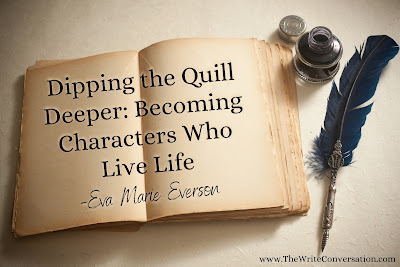
by Eva Marie Everson @EversonAuthor
When I was about 14 years old, I read a book my mother had forbidden me to read when I was 11, which was the age I turned the year it released. But at 14, the book showed up as a 4-for-a-dollar deal in my Scholastic monthly newsletter.
So, after paying my dollar, Mr. & Mrs. Bo Jo Jones (along with three other forgotten paperbacks) went home with me.
I devoured that book. I read it, literally, once a month. I could just about quote it. It was this book that led me to a determination to become a writer, although I kept that goal and dream to myself.
“If I could write like this,” I told myself, “I really could write for a living. I could tell my stories.”
What Was the Difference?
So, what was the difference between this book and other books I’d read?
Answer: the ability of the author to make me feel as though I were a part of the story.
How did she do this?
Answer: in my way of thinking, by having lived life.
In this case—in this book—the heroine and hero were 16 and 17 years old, respectively. Based on the date of Ms. Head’s birth and using an approximate writing date of 1966 (the book released in 1968 with a 1967 copyright), I can deduce that at the time of writing, the author was 51 years old—a far cry from 16 and 17. Not to mention that when Ms. Head was 16 (the age of the female protagonist), the year was 1931—a far cry from being 16 in the turbulent decade known for “sex, drugs, and rock and roll.”
Yet, somehow, Ms. Head placed herself into the hearts and minds of two teenagers who found themselves “in trouble” after high school prom (a story as old as time).
I Think I Know
How often have you read a work of fiction and thought, “I have no clue what this character is feeling . . . thinking . . . doing.” As writers we are not supposed to tell the reader what the character is feeling or thinking. We are not to write things like, “She felt proud” or “She was scared.” Instead, we are to use dialogue and prose to indicate to the reader that the character is whatever emotion they’re feeling.
Let me give you an example from Mr. & Mrs. Bo Jo Jones (and this is absolutely one of my favorite scenes):
“Your mother and I have been talking this over, and there are a few questions we want to ask you…”
“Only one,” my mother said in a shaking voice. [She was nervous.]
“Whatever your answer,” my father said, “we are agreed that an annulment is still the only solution, but this would admittedly complicate things.” He stopped and glared at Bo Jo. [He was firm.]
“Yes, sir,” Bo Jo said. [He was respectful.]
“Then you do know what I’m driving at?”
Bo Jo looked at me, and I said, “What are you driving at, Father?” [She was nervous.]
“Have I got to put it in words?” Father said, and looked at Mother who looked at her hands, which were holding each other in her lap and said, “Are you two in trouble, July?” [She was embarrassed/concerned/nervous.]
I started to speak, but Bo Jo straightened up in Father’s chair and leaned forward. I didn’t say anything, and after a minute of leaning forward and cracking his knuckles, he said, “We were, Mrs. Greher. We aren’t anymore.” I could have kissed him. I could have jumped up and down and clapped my hands. [She was relieved. She was proud.]
Do you see what I’m saying? (By the way, for any of you who don’t know it, we rarely see “italicized thought” in today’s fiction. Instead, you want to write in deep third or deep first.)
So, I think I know how Ms. Head did this and I say this as someone who is currently writing about a 17-year-old girl in 1973/1974—something I can totally relate to.
Although Ms. Head would have had different experiences in 1931 than July and Bo Jo had in 1966, she knows what it’s like to question life. To fall in love. To deal with parents. She had some inkling as to the differences “the haves” from “the havenots.” She experienced life and she dug deep into her experiences and her feelings about those experiences to write a book she will always be known for.
Here's another line from the book, spoken by the newly married couple’s landlady, a spinster named Hattie Barnes.
[Hattie] said, “I suppose the only way to get married is when you’re too young to know any better.”
I blushed and she said, “I suppose you’re going to have a baby.” But she said it so matter-of-factly I couldn’t get mad, but couldn’t think of anything to say either, and suddenly she smiled.
“Don’t mind me, child. It’s pure envy talking. It may seem to you now that life has you by the throat, but at least you know it’s there. Life has never laid a hand on me, child. Not even a finger.”
What an amazing line. If I had to guess, I’d say that Ms. Head knew what it was like to feel as though life had her by the throat and I’d also guess that she knew someone who felt that life had never laid a finger on her.
As writers, we are fairly content to live our lives in a little bubble. Sure, we go to conferences or to workshops and occasionally to a big convention. But we prefer the quiet of our own company.
Still, this doesn’t make for good writing. Life is to be experienced (John 10:10).
Today, I attended the funeral of a great man. When his family and friends stood behind the lectern to speak of his life, they relayed stories of a man who had lived life to the fullest. Each one said the same thing—In a way, Frank will always be with us because he was just that kind of guy. That’s what I want people to say about me, too. I want them to say I was “that kind of gal.”
Challenge
My challenge this month is this: go out there and live life. Enjoy it. I’m not talking about doing anything illegal . . . but grab LIFE by the throat and experience it so that you can more accurately write about it. So that your readers know that you know what you’re writing about.
Then . . . go write about it.
Go for it. Go for life.
TWEETABLEDipping the Quill Deeper: Becoming Characters Who Live Life from @EversonAuthor on @EdieMelson (Click to Tweet)
 Eva Marie Everson is the CEO of Word Weavers International, the director of Florida Christian Writers Conference, and the Director of Contests for Blue Ridge Mountain Christian Writers Conference. Her latest work, Ahoti: A Story of Tamar, co-written with Israeli bestselling author Miriam Feinberg Vamosh, released May 14, 2024 (Paraclete Press/Raven Fiction). For more information about Eva Marie, go to www.EvaMarieEversonAuthor.com.
Eva Marie Everson is the CEO of Word Weavers International, the director of Florida Christian Writers Conference, and the Director of Contests for Blue Ridge Mountain Christian Writers Conference. Her latest work, Ahoti: A Story of Tamar, co-written with Israeli bestselling author Miriam Feinberg Vamosh, released May 14, 2024 (Paraclete Press/Raven Fiction). For more information about Eva Marie, go to www.EvaMarieEversonAuthor.com.
Published on May 27, 2024 22:00
May 26, 2024
6 Things To Do When You Absolutely Can't Write
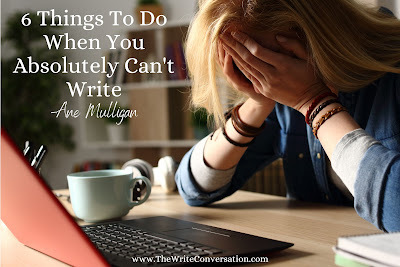
by Ane Mulligan @AneMulligan
I'm stuck. No, not with writer's block. I'm waiting for cataract surgery. Those rascally buggers came on fast and furious. One day in December I could see, and within a week, my vision was so blurry, I had to use my readers to see distance. Yikes!
To make a long story short, I had to wait 3 months to see the eye doctor. Once she recommended surgery, the surgeon called me within a week. But my surgery would be another 2 months away.
I could manage an hour or so of close work per day. If I pushed for more, a massive headache was my reward. Because I was in editing, I had to use my available time for edits.
All that to say there was no writing time. My WIP sat on my laptop in lonely abandonment.
So what CAN a writer do? 1. Turn your view to 500%. This is not a favorite mode for me. I have to scroll back and forth, and it was still fuzzy. It was an exercise in frustration.2. Use a voice recorder. This may work for some. Not so much for me. My brain works great in typing mode, but once I try to record myself, I stammer like a love-struck 13-year-old-boy.3. Brainstorm. That I can do. Especially since I'm more SOTP than plotter, brainstorming gives me a little practice plotting. Funny, I can record brainstorm ideas without stammering. Later, I can move the recordings to paper.4. Take a research field trip. All books—not just historical books—take a little research. This might be a good time to visit some of the tourist sites in your town. Go to the country for a picnic. Do something your character might do. In my upcoming release (fall 2024) Take My Hand, my main character takes her little brother to a local farm to pick blueberries, where she reveals a major plot point to him. I took a day-trip to a local farm. While I didn’t pick blueberries (they weren’t in season) I did pick an ice cream flavor.5. Go to lunch with another writer. Being around other writers is always desirable. You get to eat good food, and the fellowship lifts your spirits. Not to mention—okay, I’m mentioning it—toss in a little brainstorming for each of you and be encouraged that you're not alone.6. Pray. I listed all the active things to do first, but the most important item is prayer. God knows what you're going through. This down time—or at least slowed time—is according to His purpose. Often in the business of life or the tyranny of the urgent, my prayer life gets the short shift. So while my eyes are awaiting surgery, I'll use the time to draw closer to God. I get the feeling He's anxious to spend time with me.
Join the conversation. If you have any other ideas for me, do tell! I still have another month to go before I'll be seeing again.
TWEETABLE6 Things to Do When You Absolutely Can't Write - @AneMulligan on @EdieMelson (Click to Tweet)
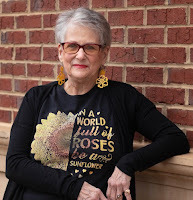 Ane Mulligan lives life from a director’s chair, both in theatre and at her desk creating novels. Entranced with story by age three, at five she saw PETER PAN onstage and was struck with a fever from which she never recovered—stage fever. One day, her passions collided, and an award-winning, bestselling novelist emerged. She believes chocolate and coffee are two of the four major food groups and lives in Sugar Hill, GA, with her artist husband and a rascally Rottweiler. Find Ane on her website, Amazon Author page, Facebook, Instagram, Pinterest, The Write Conversation, and Blue Ridge Conference Blog.
Ane Mulligan lives life from a director’s chair, both in theatre and at her desk creating novels. Entranced with story by age three, at five she saw PETER PAN onstage and was struck with a fever from which she never recovered—stage fever. One day, her passions collided, and an award-winning, bestselling novelist emerged. She believes chocolate and coffee are two of the four major food groups and lives in Sugar Hill, GA, with her artist husband and a rascally Rottweiler. Find Ane on her website, Amazon Author page, Facebook, Instagram, Pinterest, The Write Conversation, and Blue Ridge Conference Blog.
Published on May 26, 2024 22:00
May 25, 2024
Why Make Social Media Part of Your Writing Ministry?

by Edie Melson @EdieMelson
Is social media a wise investment for writer?
The short answer?
It depends on our reason for writing.
Social media. Often just the mention of this subject conjures up hours of time. First there’s the time it takes to hang out online, then the time it takes to figure out what to say, who to LIKE and which updates to read, comment on, and share.
Is there a chance that someone out there in cyberspace might actually—either now or sometime in the future—read what I’ve written and been impacted by it?
There has been a lot of discussion—ironically taking place ON social media—about whether social media is still a valuable endeavor for believers.
The truth is this:
Social media is hard work. It takes being intentional and keeping your goals in mind.
And those goals are what can get us in trouble.
I think most people approach social media with the wrong goal in mind and that leads to frustration.
First, I want to emphasize that each person’s writing journey is unique. Because of that, we’re each going to gather different tools, and find the ones that work best for us.
But I do believe social media can be a valuable tool for most writers.
Here are my 2 bottom-line reasons for doing social media1. Personally, I believe social media is an extension of the writing ministry God has given. My primary reason for being on social media is to serve others and to build connections. 2. I believe God has called me to be a light in the dark. So the darker social media gets the stronger my call to stay there.
Social Media Benefits for Me
I get a chance to serve and encourage my audience. I can post updates that provide valuable information and encouragement without asking for something in return. This builds trust and lays the groundwork that encourages them to search for me in other places (like my ministry).It gives me a place to connect with others who have similar interests. I have opportunities to interact with other ministry leaders. These interactions include: encouragement from others and toward others; valuable leads on opportunities; opportunities to share and receive information about some aspect of ministryIt gives me opportunities to share the message(s) of my heart. I can do this through invitations to post on blogs, become a guest on podcasts, and in many other ways.
What social media does not do for me
Social media doesn't sell my books consistently or support my ministry financially. There isn’t (nor has there ever been, as far as I can tell) a direct connection between advertising a product or service on social media and selling it. It’s not possible to quantify the percentages sales based on who sees a social media update.
Why doesn’t social media work for sales?Most people are on social media to be social. Sometimes they are looking for information, but in general, they’re just at hanging out.An invitation to buy something is seen as an interruption. I don’t know about you, but I get irritated by the paid advertising slipped into my browsing pleasure. The algorithms for most networks make it difficult to get visibility when someone selling something. Social media networks want to please their users and deliver the experiences they enjoy. Since most people are irritated by advertising, these networks try to limit anything that could be seen as a negative experience.
Bottom LineIf a writer is on social media solely to sell, then it’s going to be difficult to find value in being there.
However, if you’re looking to make connections and increase your ability to serve your audience—as well as the other benefits mentioned above—I believe you will also find value in staying active on social media.
TWEETABLEWhy Make Social Media Part of Your Writing Ministry? @EdieMelson (Click to Tweet)
 Edie Melson is a woman of faith with ink-stained fingers observing life through the lens of her camera. No matter whether she’s talking to writers, entrepreneurs, or readers, her first advice is always “Find your voice, live your story.” As an author, blogger, and speaker she’s encouraged and challenged audiences across the country and around the world. Her numerous books reflect her passion to help others develop the strength of their God-given gifts and apply them to their lives. Connect with her on her website, through Facebook, Twitter and on Instagram.
Edie Melson is a woman of faith with ink-stained fingers observing life through the lens of her camera. No matter whether she’s talking to writers, entrepreneurs, or readers, her first advice is always “Find your voice, live your story.” As an author, blogger, and speaker she’s encouraged and challenged audiences across the country and around the world. Her numerous books reflect her passion to help others develop the strength of their God-given gifts and apply them to their lives. Connect with her on her website, through Facebook, Twitter and on Instagram.
Published on May 25, 2024 22:00
May 24, 2024
The Art of Scene Crafting: A Guide to Amplifying Narrative Impact
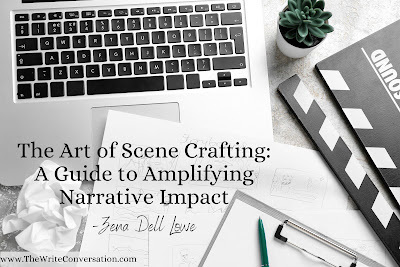
by Zena Dell Lowe @ZenaDellLowe
As storytellers, we hold the power to shape worlds, captivate audiences, and evoke profound emotions through our craft. But there are times when writers unwittingly diminish the power of their own stories. Since stories unfold as a result of one scene, plus another scene, plus another scene and so on, the place to start is with scene construction, and learning how to maximize the dramatic potential of each moment.
Number 1: Milk each scene for everything it’s worth
When it comes to storytelling, every scene, every moment matters. Every scenario holds the potential to deepen our understanding of characters, their most important relationships, and their internal emotional state. No instance is inconsequential; each serves as an opportunity to enrich the narrative tapestry. When you’re writing your story, milk each scene for everything it's worth in terms of revealing to us, the audience, who that character is, what their interpersonal relationship struggles are, and where they are at emotionally at that exact moment in the story. Nothing can be wasted. You must use every single moment that you have at your disposal.
Let's say you have a character going from point A to point B. Rather than a mere transition, it’s an opportunity to tap into their psyche. Try to find a way to utilize it, to reveal something extra to your audience. For example, what is their internal emotional state? Are they anxious? Are they confident? Are they sad or melancholy? Do they march passed a homeless person, so absorbed in their own world that they don't even see this person? Do they march towards a library, but then see a stray dog and stop to give it some food, even though the character has no more money in their pocket? Maybe they don't march to the library at all. Maybe they meander or stroll and window browse, which shows they're not in a hurry. But it also shows they're maybe avoiding or dreading something. You CAN just have them walk to the library. But if you do that, you're missing a precious chance to expose more to us than at first might meet the eye. Always be looking for those opportunities to milk every moment to reveal character, character relationships, or their internal emotional state.
Number 2: Any moment can be enhanced, including dialogue scenes
If you have two characters meeting as friends to discuss the latest developments in their individual love-lives, you want to use that scene to reveal the depth and breadth of their relationship. What happens is writers will stick to the literal dialogue to try to get exposition out, or they’ll have those characters speaking in low-context dialogue for the audience’s benefit, and then they'll ignore or miss the opportunities to reveal the subtleties of character dynamics. So, what could you do instead? Perhaps you show them in action in the kitchen, where one grabs a teacup and the other grabs the kettle, and they do a dance around the kitchen as they carry on a conversation, which shows us they've done this a million times. This is a ritual of theirs. It shows familiarity. So, you're taking something simple and you're magnifying it, revealing even more. You’re milking it for all it's worth.
There are so many ways to do this. You could have a character kneel to pick up a quarter, then look around to see who dropped it. That reveals something about them. You could have a confident character striding with purpose down the sidewalk, but then they trip over a crack and quickly look around to see if anyone saw them stumble. This behavior shows us that deep down they’re insecure, or perhaps it's an omen of bad things to come. You might not know what it means until the next scene, but you can still take the time to milk it. Don’t let a single story moment be wasted.
Number 3: Everything that happens should play into the larger narrative in some way
Whenever anything happens in your story, whether it be set-ups, dialogue, character revelations, etc., anything that you include in any scene of your story must ultimately play into the narrative overall. You can’t have stuff happen in a scene if it doesn’t somehow impact the larger narrative. It should come back into play in some way. Otherwise, you’re missing a golden opportunity to make each moment matter.
For example, I recently critiqued a script where the writer opened on a scene between a husband and a wife, where the man is watching his wife learn to fence. He’s saying things to the instructor, like, "Don't be easy on her. I want her to learn to defend herself." The problem is, this never came back up again in the story, even though she did need to learn to defend herself because she was targeted by bad guys. You don’t want to have a character be learning a particular skill at the outset and then not have that skill come up again later in the narrative. It can be either to the character's benefit or detriment. It doesn’t matter. It just needs to play into the narrative.
Number 4: Even playful dialogue scenes should ultimately matter to the larger story
In another recent critique, the writer had included some lovely dialogue exchanges between a married couple who were discussing certain films they’d enjoyed from the past. Now, it perfectly legitimate to use exchanges like this in the moment only to reveal the depths of their camaraderie and connection. There can be witty banter between them. We can see a tradition they’ve established. But it's even better if this element comes back into play in the narrative later. In the case of this story, the husband ends up dying. So, what if one of the movies they discussed at the beginning ends up streaming on the TV in the hospital room, right after he’s passed? The wife is in shock, but she hears the movie playing. She looks up, and… then what? Bringing it up now allows this element to mean more than it did before. Now, it emphasizes what she’s lost. Now, it can be utilized as a physical manifestation of her grief. She can actually do something with it. Perhaps she picks up the TV remote and hurls it across the room. The point is to us how she feels. You’re bringing back this sweet moment from the beginning to maximize the dramatic potential of this moment. You always want to bring things back into play once you've set them up. It makes the story so much more interesting and enjoyable to the audience.
Conclusion:The bottom line is that you want to milk each moment of your story. You do this by recognizing every moment as a setup. Whatever you setup ultimately needs to come back into play later. Nothing brings joy to an audience more than a good payoff.
For more tips like these, check out my weekly podcast for storytellers on my YouTube channel:https://www.youtube.com/@thestorytellersmission8256/videos, or find me on the podcast app of your choice. Be sure to like, comment, and subscribe!
TWEETABLEThe Art of Scene Crafting: A Guide to Amplifying Narrative Impact from @ZeanDellLowe on @EdieMelson (Click to Tweet)
 Zena has worked professionally in the entertainment industry for over 20 years as a writer, producer, director, actress, and story consultant. Zena also teaches advanced classes on writing all over the country. As a writer, Zena has won numerous awards for her work. She also has several feature film projects in development through her independent production company, Mission Ranch Films. In addition to her work as a filmmaker, Zena launched The Storyteller’s Mission with Zena Dell Lowe, a podcast designed to serve the whole artist, not just focus on craft. In 2021, Zena launched The Storyteller’s Mission Online Platform, where she offers advanced classes and other key services to writers. Zena loves story and loves to support storytellers. Her passion is to equip artists of all levels to achieve excellence at their craft, so that they will truly have everything they need to change the world for the better through story.
Zena has worked professionally in the entertainment industry for over 20 years as a writer, producer, director, actress, and story consultant. Zena also teaches advanced classes on writing all over the country. As a writer, Zena has won numerous awards for her work. She also has several feature film projects in development through her independent production company, Mission Ranch Films. In addition to her work as a filmmaker, Zena launched The Storyteller’s Mission with Zena Dell Lowe, a podcast designed to serve the whole artist, not just focus on craft. In 2021, Zena launched The Storyteller’s Mission Online Platform, where she offers advanced classes and other key services to writers. Zena loves story and loves to support storytellers. Her passion is to equip artists of all levels to achieve excellence at their craft, so that they will truly have everything they need to change the world for the better through story.To find out more about Zena or her current courses and projects, check out her websites at WWW.MISSIONRANCHFILMS.COM and WWW.THESTORYTELLERSMISSION.COM
Published on May 24, 2024 22:00



